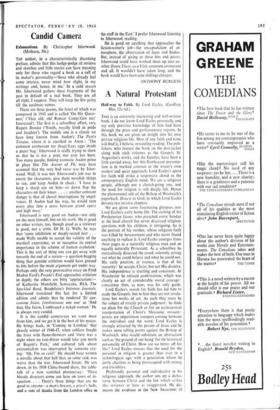Candid Camera
Exhumations. By Christopher Isherwood. (Methuen, 30s.) THE author, in a characteristically disarming preface, admits that this hodge-podge of reviews and sketches and little stories can have meaning only for those who regard a book as a cell of its maker's personality—'those who already feel some interest, never mind how slight, in my writings and, hence, in me.' In a cold season Mr. Isherwood gathers these fragments of the past in default of a real book. They are all all right, I suppose. They will keep the fire going till the coalman comes.
There are three poems, the latest of which was composed in 1943 and is called 'On His Queer- ness' ('That old, old Roman Camp/Got me/ Interested'). The first is a schoolboy effort, very Rupert Brooke ('Youth, royally lived in pride and laughter'). The middle one is a classic we have long known from Auden's The Poet's Tongue, where it is ascribed to Anon.: 'The common cormorant (or shag)/Lays eggs inside a paper bag.' Isherwood is really trying to show us that he is not a poet, nor ever has been. Too many people, finding aromatic Auden prose in plays like The Ascent of F6, may have assumed that the very bad verse was by Isher- wood. Well, it was not. Isherwood's job was to create the characters, give them novelish things to say, and keep Auden in check : 'I have to keep a sharp eye on him—or down flop the characters on their knees . . . : another constant danger is that of choral interruptions by angel- voices. If Auden had his way, he would turn every play into a cross between grand opera and high mass.'
Isherwood is very good on Auden—not only on the man himself, but on his work. He is good on other writers, too, though good as a reviewer is good, not a critic. Of H. G. Wells, he says that 'some inhibition or deeply-seated fear . . . made Wells unable to accept the validity of the mystical experience, or to recognise its central importance in the scheme of human evolution.' This is the sort of thing one can get away with towards the end of a review—a question-begging thing that genuine criticism would have ground to bits before the main argument got under way. Perhaps only the very provocative essay on Ford Madox Ford's Parade's End approaches criticism in depth; the others are bitty 'appreciations'— of Katherine Mansfield, Santayana, RLS, The Speckled Band, Baudelaire's Intimate Journals. Isherwood translated this last for a limited edition and admits that he rendered 'Et que. comine Ixion, rembrassasse une nue' as 'And that, like Ixion, I embraced a naked woman.' He is always very candid.
It is the candid camera-eye we want most from him, and we get it in the best of his essays. He brings back, in 'Coming to London,' that ghastly winter of 1946-47, when soldiers fought the frost with flame-throwers and 'there was a night when no taxi-driver would take you north of Regent's Park,' and cultured talk about existentialism was interrupted by someone cry- ing: 'Oh, I'm so cold!' He should have written a novella about that hell that, so some said, was worse than the war. Isherwood listens. He sets down, in his 1938 China-bound diary, the table- talk of a now vanished plantocracy : 'These bloody directors come out here on tours of in- spection. . . . There's three things that are no good to anyone—a man's breasts, a priest's balls, and a vote of thanks from the London office to the staff in the East.' I prefer Isherwood listening to Isherwood reading.
He is good on anything that approaches the fiction-writer's job—the encapsulation of at- mosphere, the observation of faces and bodies. But, instead of giving us these bits and pieces, Isherwood could have worked them up into an- other Down There on a Visit, common cormorant and all. It wouldn't have taken long, and the book would have been nine shillings cheaper.
ANTHONY BURGESS






























 Previous page
Previous page